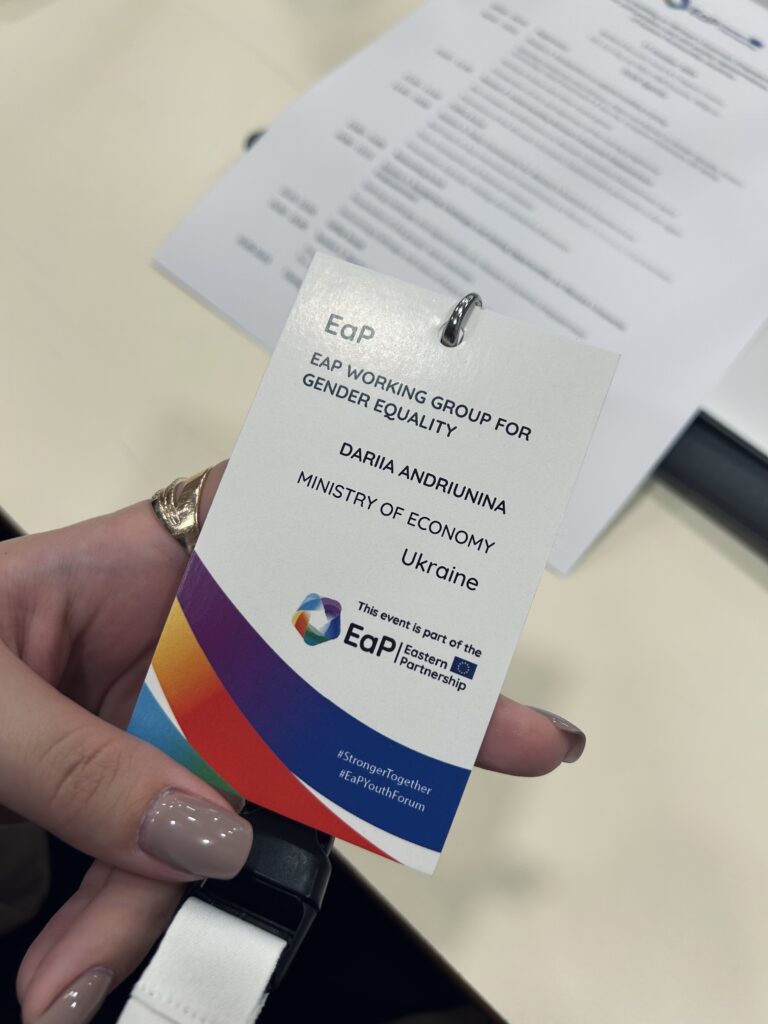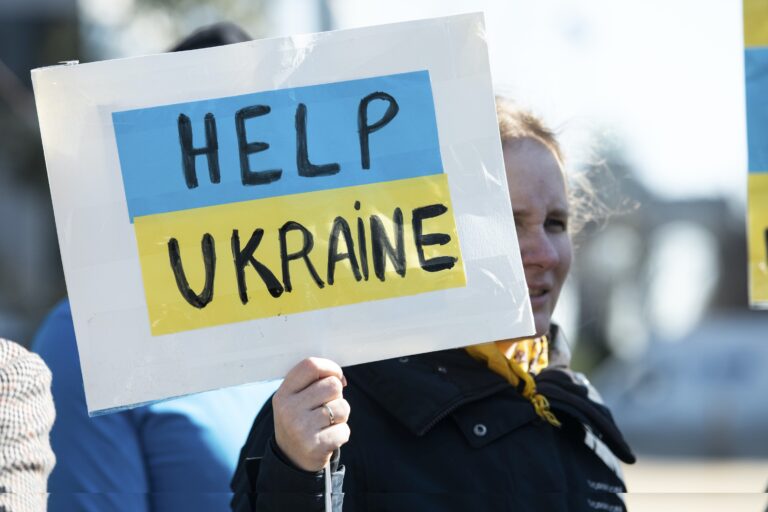
Taking part in the EaP Working Group on Gender Equality: my experience and insights
Author: Dariia Andriunina, Ukrainian YEA
I have now been serving the people of Ukraine as a civil servant for four years. This autumn, this led me to take part in the Eastern Partnership Working Group on Gender Equality – and all roads in this context have recently taken me to Brussels, the heart of the European Union.
So on a rainy autumn day at the end of the working week, I took the road – 19 hours on the bus and two hours by plane. My trip came just after my active involvement in organising and hosting a big event “Towards Closing the Gender Pay Gap”, dedicated to the presentation of the government’s National Strategy for Closing the Gender Pay Gap for the period to 2030.
Despite the arduous nature of the journey, I didn’t feel tired from the trip until I got home, because I was focused on my main task: to continue to look for best practices in the field of gender equality because I am convinced that even in such dark times we have no right to stop or pause our efforts to build a society that is fair for all, where everyone can fulfil themselves.
Ukrainian women stand side by side with men on the frontline, creating businesses, becoming economic drivers for their families and the country as a whole, paying taxes, saving and raising children, volunteering, working on the diplomatic front, supporting themselves and others. The list is not exhaustive, because they do all of this and much more. However, still today, women often have the same responsibilities, but not the same opportunities to exercise their rights. It is our task to correct this. Women should be involved in all decision-making, in wartime as in peacetime. Creating the necessary conditions for women’s involvement in the labour market and the recovery process in Ukraine should be a priority. It is necessary to support them and to create an environment that will foster the development of women’s entrepreneurship and women’s leadership.
So what exactly is the EaP Working Group on Gender Equality actually doing? First, the Working Group aims to bring together high-level representatives and experts on gender issues from the EaP countries, EU institutions, member states, and civil society.
It is well known that gender equality is a core value and key priority of the EU and the Eastern Partnership, an inalienable human right, as well as an imperative for the functioning of democracy, welfare, economic growth, prosperity, good governance, peace, and security. In line with the EaP agenda and the EU’s Gender Action Plan (GAP) III, gender equality and women’s empowerment should be promoted in all EaP policy areas and within all five long-term objectives:
i) Resilient, sustainable, and integrated economies.
ii) Accountable institutions, rule of law and security.
iii) Environmental and climate resilience.
iv) Sustainable digital transformation.
v) Sustainable, gender-equal, just and inclusive societies.
These priorities were reaffirmed at the 2021 Eastern Partnership Summit, with the Summit Declaration paying particular attention to aspects related to gender equality. The EU is committed to supporting the Eastern partner countries in their efforts to close gender gaps, systematically implement gender mainstreaming, gender-responsive budgeting and gender-sensitive reforms. And each year, the Gender Equality Working Group will focus on one of the five long-term goals of the Eastern Partnership.
It is planned that the specific tasks of the Working Group will include an annual focus on gender equality in the context of one of the five EaP priorities; discussing best practices on progress in gender equality in the selected priority area; exchanging views, opinions, and solutions on challenges to gender equality; providing proposals and recommendations on relevant policy documents, programmes, events, meetings, projects, and communication strategies; and, of course, to inspire each other by achieving clearly defined goals in the field of gender equality.
The EaP Gender Equality Working Group will build on and contribute to existing bilateral and regional programmes, gender analysis and implementation plans at the country level, as well as bilateral dialogues, such as the annual human rights dialogues.
In 2023, the focus was on “Resilient and Inclusive Economies”, including gender-responsive economic policies and women’s economic empowerment. The Working Group held an in-depth discussion on how gender equality and women’s empowerment could be further developed and integrated into other policies, programmes, and activities in this priority area.
On the eve of the meeting, the participants of the Working Group were provided with a refresher session on women’s economic empowerment, organised by the EU4Gender Equality Reform Helpdesk. The training session covered the following topics: “Understanding women’s economic empowerment”, “Policy frameworks for women’s economic empowerment”, “Overcoming challenges and seizing opportunities in women’s economic empowerment”, “Women’s economic empowerment in Ukraine”, “Women’s economic empowerment in the Eastern Partnership region”, and “Women’s economic empowerment in Ukraine”. Each block was accompanied by a practice-oriented presentation and interactive discussion.
This event once again confirmed the importance of achieving gender equality in the context of Ukraine’s preparation for accession to the European Union. Participation in this event was important in view of the need to share experience in ensuring gender equality and inclusion in the development of Ukraine’s economy.

Ukraine’s participation in the Working Group is important in many contexts. First, the EU is a strategic partner of Ukraine, and one of the EU’s core values is gender equality. It is important for Ukraine to comply with European standards in this area if it is to join the EU as quickly and successfully as possible. Participation in the Working Group will help to highlight Ukraine’s efforts on this path. In addition, gender equality is not only a key value, but also an inalienable human right. Participation in the Working Group underscores Ukraine’s commitment to ensuring equal rights and opportunities for all its citizens, regardless of gender. Gender equality is also an imperative for the functioning of democracy and the rule of law. It is an important aspect in strengthening institutions, accountability, and the rule of law in Ukraine. Gender equality also contributes to the social and economic development of the country, as equal access to resources and opportunities for women and men contributes to a better quality of life and economic growth. And, of course, gender equality plays an important role in achieving the sustainable development goals, in the areas of environment, digital transformation and fair and inclusive societies.
It is vital for Ukraine to participate in the Gender Equality Working Group, as it contributes not only to compliance with European standards, but also to strengthening human rights, democracy, economic development and achieving sustainable development goals.
I would like to thank our partners from the European Commission and all the participants of the event for the valuable exchange of experience. There is a lot of work ahead. I look forward to our future meetings to share our achievements and learn about the successes of our partners.
More campaign pages:
Interested in the latest news and opportunities?
This website is managed by the EU-funded Regional Communication Programme for the Eastern Neighbourhood ('EU NEIGHBOURS east’), which complements and supports the communication of the Delegations of the European Union in the Eastern partner countries, and works under the guidance of the European Commission’s Directorate-General for Neighbourhood Policy and Enlargement Negotiations, and the European External Action Service. EU NEIGHBOURS east is implemented by a GOPA PACE-led consortium. It is part of the larger Neighbourhood Communication Programme (2020-2024) for the EU's Eastern and Southern Neighbourhood, which also includes 'EU NEIGHBOURS south’ project that runs the EU Neighbours portal.

The information on this site is subject to a Disclaimer and Protection of personal data. © European Union,




